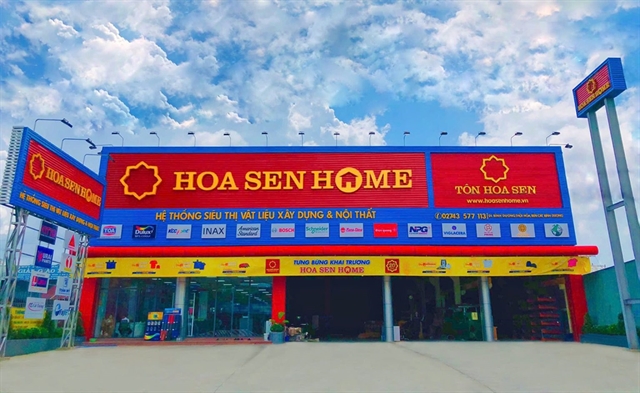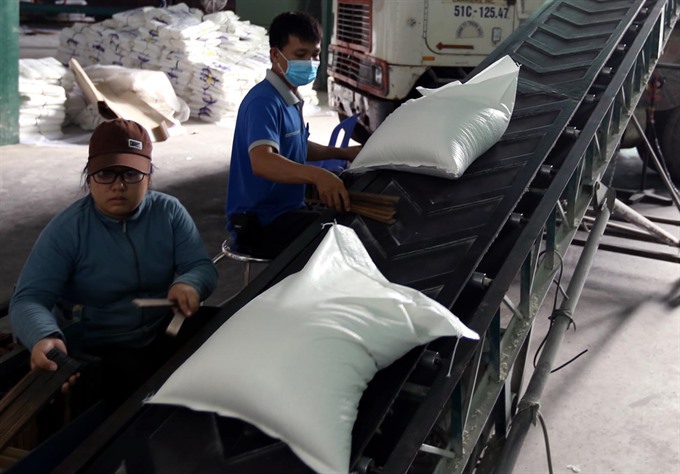 Economy
Economy

Despite facing difficulties, Việt Nam will strive to achieve rice exports of more than 5 million tonnes this year, the Việt Nam Food Association has said.
 |
| Despite facing difficulties, Việt Nam will strive to achieve rice exports of more than 5 million tonnes this year, the Việt Nam Food Association has said. — VNA/VNS Photo |
HCM CITY — Despite facing difficulties, Việt Nam will strive to achieve rice exports of more than 5 million tonnes this year, the Việt Nam Food Association has said.
Speaking at a meeting to review the VFA’s performance last year in HCM City on Monday, its secretary, Huỳnh Minh Huệ, said last year only 4.89 million tonnes were exported for $2.12 billion, a 25.5 per cent fall in volume and 20.57 per cent decline in value.
There was excessive supply in the global market last year, and there has been a recent trend of major importing countries increasing domestic production to reduce imports, he said.
Việt Nam’s rice exports are likely to face another difficult year as supply outstrips demand and global competition intensifies, he said.
He quoted the US Department of Agriculture as saying global rice output in 2016/17 is estimated to increase by 1.6 per cent from last year to 480 million tonnes due to an expansion in the area under rice in many countries including Australia, Myanmar, Brazil, India, Indonesia, North Korea, Pakistan, Thailand, and the US, he said.
Global exports are expected to rise by one million tonnes or 2.6 per cent to 40.6 million tonnes, he said.
Stockpiles have been increasing for the last three years and are expected to reach the highest levels since 2001/02 crop, he said.
Huỳnh Thế Năng, VFA chairman, said despite the hurdles, rice businesses would strive to export higher volumes than last year to ensure farmers can sell off as much of their outputs as possible.
In the long term the domestic rice sector targets exports of high-value rice to affluent markets, he said.
He said the Plant Protection Department and other relevant agencies should take measures to improve the hygiene and food safety of Vietnamese rice to enable more exports to choosy markets.
The association said rice exporters should meet hygiene and food safety standards and strengthen linkages with farmers to ensure a steady source of the grain to meet market demand.
Huệ called on the Ministry of Agriculture and Rural Development to build an international standard laboratory in Cần Thơ to help exporters check their rice quality, especially look for plant protection chemical residues, instead of sending to other countries for analysis as is done now.
Năng said authorities in rice growing localities need to do more to instruct farmers in producing rice meeting safety standards, encourage them to use more certified rice seedlings and improve technical and financial support systems.
Đỗ Hà Nam, chairman and general director of Intimex Group Joint Stock Company -- one of the country’s 10 largest rice exporters -- said while exports of other kinds were down, exports of Japonica and sticky rice went up by 136.95 per cent and 96.59 per cent.
“But farmers have [since] rushed to grow more sticky rice, which [poses a] risk.”
He said the Government should work with China to facilitate exports of Vietnamese rice to that country.
“We face severe competition in terms of price from Pakistan and India.
“There may be difficulties but if we choose to invest in varieties like fragrant rice and sticky rice, there will be opportunities.”
Lê Thanh Tùng of the Crop Production Department said Việt Nam has the potential to boost exports of sticky, fragrant, Japonica and high-quality rice varieties.
Besides improving quality, Vietnamese firms should also focus on building brands, he said.
The association on Monday called on the Government to approve a programme to stockpile rice temporarily from the winter-spring crop to ensure farmers do not lose.
Tùng said the Ministry of Agriculture and Rural Development, based on rice production and consumption in February and March, would make specific recommendations for it.
The quality in the 2016/17 winter-spring crop would be better than last year’s, he added. — VNS